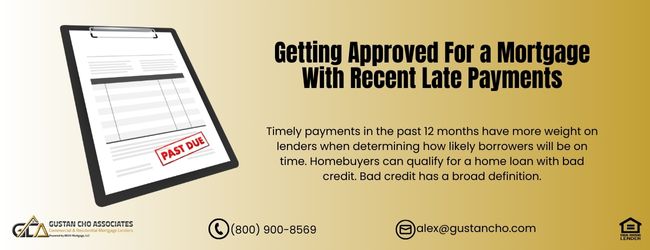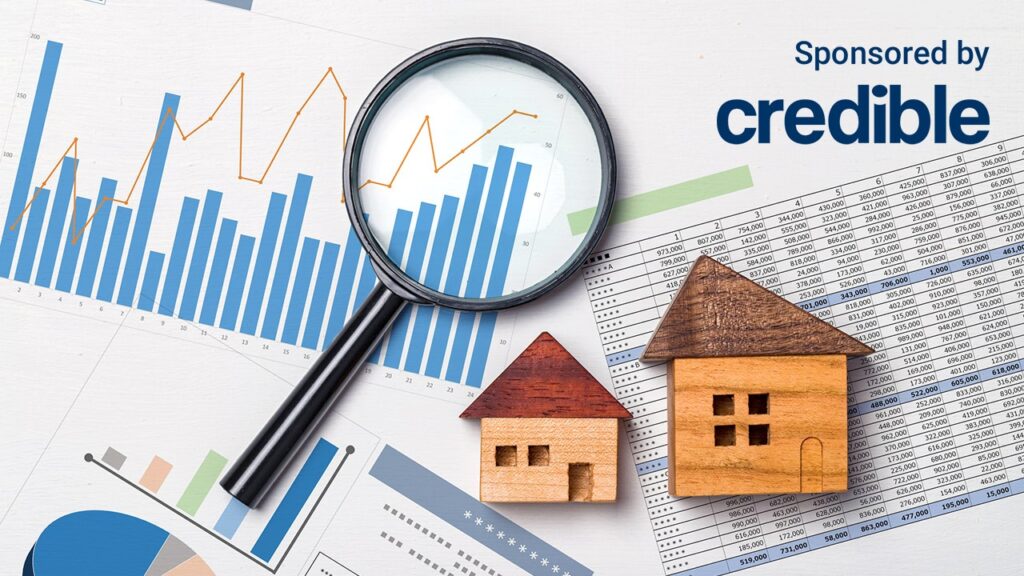Getting Approved For a Mortgage With Recent Late Payments

In this blog, we will review qualifying for a mortgage with recent late payments. Timely payments in the past 12 months are crucial when qualifying for a home loan. It is fine to have prior late payments or bad credit when qualifying for a mortgage. Dale Elenteny of GCA FORUMS Mortgage Group compares bad credit versus late payment as the following:
Timely payments in the past 12 months have more weight on lenders when determining how likely borrowers will be on time. Homebuyers can qualify for a home loan with bad credit. Bad credit has a broad definition.
Does a late payment two years ago constitute bad credit? Does a few collection accounts mean the borrower has bad credit? Do maxed-out credit scores mean bad credit? Is too many credit inquiries bad credit? Do recent late payments mean late payments? In the following sections, we will discuss qualifying for a mortgage with recent late payments.
What Is Considered Bad Credit When Buying a House?
Bad credit can cover a wide range of less-than-perfect credit items. When it comes to mortgage loans, bad credit generally means that a mortgage loan applicant’s credit profile and scores fall below the mortgage lender’s minimum lending requirements. Bad credit in mortgages can mean having the following:
- prior bankruptcy
- prior foreclosure
- prior deed-in-lieu of foreclosure
- short sale
- charge off
- collection accounts
- tax liens
- tax liens that have been paid off
- judgments
- judgments that have been paid off
- late payments from years ago
- recent late payments in the past 12 months
- late payments after bankruptcy or housing events
This article will discuss and cover qualifying for mortgage with recent late payments. You can have prior bad credit, unpaid collections and charge-off accounts, and other derogatory credit tradelines and can qualify for a mortgage if you had timely payments in the past 12 months. You do not have to pay outstanding collection accounts or charge-offs as long as you have proven to yourself that you had timely payments in the past 12 months. There are instances where consumers get late payments in the past 12 months for one reason or another. You can qualify for a mortgage with recent late payments in the past 12 months under certain circumstances. Click Here to Buy a House Today
Can I Qualify For a Mortgage With Bad Credit?
Homebuyers can qualify for a mortgage with prior bad credit. However, borrowers need to have re-established their credit. Borrowers need to be timely on all of their payments in the past 12 months to get an approve/eligible per the automated underwriting system. It is possible to get a home loan with bad credit. However, lenders want to know the reason for bad credit and whether it was a one-time event or financial irresponsibility:
- Has the borrower re-established?
- Has the borrower being able to repay the new housing payment without stress?
- Borrowers can have had prior bad credit.
- One of the things lenders look for is recent late payments in the past 12 months.
- How recent were late payments to how many creditors
Borrowers can qualify for a home mortgage with prior bad credit. However, timely payments in the past 12 months are very important to get an approve/eligible per the automated underwriting system.
What Do Mortgage Lenders Look For on Credit Reports?
Overall credit history from the credit report will be carefully reviewed and analyzed. Borrowers with a ten-year credit history case scenario: The mortgage underwriter will review payment patterns on overall credit history. For those seeking a home loan with bad credit, there has to have been a time when their credit went bad. Why did it go bad? Why were they paying bills on time and suddenly causing credit to deteriorate? Was it a loss of a job? Was it the loss of your business? Was it a divorce? Was it medical reasons?
Letter of Explanation Required For a Mortgage With Recent Late Payments?
As mentioned earlier, mortgage underwriters will review the overall credit history. They look at overall payment history and patterns and see when credit went bad. Mortgage lenders understand that there are periods when consumers face extenuating circumstances. Examples of extenuating circumstances include the following:
- such as a job loss
- business loss
- divorce
- medical issues
- personal issues where their credit deteriorates
The Great Recession of 2008 has ruined thousands, if not millions, of people and businesses. Many were forced into filing bankruptcy and lost their homes. If a person loses their job or business, they have no source of income to continue to pay their debt obligations. It is not a crime to fall behind on their debt to their creditors.
Mortgage With Recent Late Payments With High Credit Scores?
Millions of Americans fear a repeat of the 2008 financial crisis due to key signs that make sense. Under the Biden Administration, key factors signal another housing and economic collapse. Soaring inflation, skyrocketing home prices, out-of-control interest rates, sporadic stock market, and deteriorating financial numbers.
To many, the 2008 financial crisis seemed like it was just yesterday. Many homeowners are on the fence and worried about home prices tumbling.
Homebuyers have been on standby since the coronavirus outbreak in February 2020, waiting for a housing market correction. However, the housing market keeps on going up even with skyrocketing inflation, surging rates, and an unstable economy with a government with no solid leadership. Mortgage lenders are increasing lending standards and overlays due to fear of another housing crisis. Click Here to apply for mortgage with low credit score
How Did The 2008 Financial Crisis Affect Homeowners?
Homeowners saw their home values plunge during the 2008 financial crisis. Home values plummeted, and many homeowners had negative equity. Many of us still remember the 2008 financial crisis like it was yesterday. Dale Elenteny of Gustan Cho Associates remembers the 2008 real estate crisis as follows:
Many folks during the 2008 financial crisis could not take the dozens of daily harassment calls from credit collection agencies at all times of hours, seven days a week, with threatening phone calls that they were going to get sued.
Getting a new job was difficult due to the Great Recession of 2008. Whole industries got wiped out or nearly wiped out. Real estate agents, mortgage brokers, real estate investors, and those in the construction industry were hurt the most. They had the highest bankruptcy and foreclosure rates in the country. Will a repeat of the Financial Crisis of 2008 happen again? Mortgage lenders look at borrowers with recent late payments and bad credit to ensure they can repay their new mortgage loan.
Will the Financial Crisis of 2008 Happen Again?
Many top-producing full-time realtors and mortgage broker colleagues have filed for bankruptcy or went through a foreclosure, deed-in-lieu of foreclosure, or short sale after the 2008 financial crisis. Many had to leave the field and find other lines of work. Some had to get two part-time jobs to make ends meet. I was a real estate investor with 7 apartment complexes, just under 3,000 residential units, with multiple homes. Lost it all and got into the mortgage business after the real estate and mortgage meltdown of 2008. Things were bad, and the good old Golden days would not return.
Changes In the Mortgage Industry After The Financial Crisis of 2008
The whole mortgage industry went through a major overhaul. Mortgage loan originators were now expected to become licensed on the federal and state levels. All of them had to take national and state exams. David Reinholtz, President of Loan Officer School said the following about getting into a new career as a loan officer: Mortgage loan originators had to go through federal and state background investigations and annual credit checks. For example, if a mortgage broker working for a sub-prime lender:
- lender closed their doors
- show documentation that the mortgage company went out of business
Thousands of mortgage and real estate companies shut their doors due to the Great Recession of 2008. Letters of explanation should address the extenuating circumstances and be accompanied by documents such as termination letters, tax returns showing the decline in income, or other documents. Mortgage underwriters do not go by sympathy but by facts.
How Do Mortgage Lenders Look at You With Bad Credit?
For Home Buyers seeking a home loan with bad credit, lenders want to see they have re-established credit after a period of bad credit. Most mortgage lenders do not want to see any late payments or recent late payments after being back on their feet. Timely payment history in the past 12 months is extremely important. Recent late payments will be a major negative.
How Long After a Late Payment Can I Get a Mortgage?
Most mortgage lenders do not want to see any recent late payments in the past 12 months. One or two recent late payments will not always be a deal-breaker. Mortgage underwriters will want to see why borrowers had recent late payments in the past 12 months. Multiple recent late payments in the past 12 months will be a concern. You may need to either do credit repair to remove those recent late payments from the credit report or wait until the recent late payments have been seasoned.
Can I Get a Mortgage With a 30-Day Late Payment?
Borrowers with recent late payments in the past 12 months may need to correct the recent late payments issues first. Mortgage lenders like myself will go off Fannie Mae’s or Freddie Mac’s Automated Underwriting System findings.
GCA FORUMS Mortgage Group has no mortgage lender overlays on government and conventional loans. If the automated findings yield an approve/eligible with recent late payments, then we have no problem.
The Automated Underwriting System will recognize the recent late payments and may render an automated approval. We need to correct late payments on the credit report if borrowers do not get an automated approval per DU FINDINGS or LP FINDINGS due to recent late payments. We need to see if we can get them corrected.
Will I Get a Denied a Mortgage With Recent Late Payments?
One solution to removing late payments from credit reports is to contact the creditor. See if they can remove the recent late payments from the credit report on a one-time mercy basis. For consumers who have been timely with the creditor and have always paid monthly payments on time, the creditor may remove the recent late payments as a one-time courtesy off the credit report. If the customer service representative says no, politely ask to speak to a supervisor. Request to the supervisor for mercy and are applying for a mortgage. If they can remove the late payment off the record on a one-time basis, promise them you will never be late again. Many times this tactic works.
Should I Fix My Credit Before Applying For a Mortgage?
I have seen credit repair consultants do magic, such as removing late payments, collections, judgments, charge-offs, bankruptcies, foreclosures, short sales, deeds-in-lieu of foreclosures, and other derogatory credit items off a person’s credit report:
- Do not just go online and shop for any credit repair consultant.
- Make sure it is a referral and contact their previous clients.
- Get references on how the credit repair consultant did for them.
- I have had my credit repaired and was extremely satisfied with my credit repair consultant.
- Credit repair can do more damage than good when qualifying for a mortgage.
- Credit repair is not required to fix credit to qualify for a mortgage
The team at GCA FORUMS Mortgage Group will help you with what credit fixes you need to do to qualify for a home loan at no charge. If everything else fails with recent late payments, then you need to season the late payment history for 6 to 12 months and wait until it ages. Apply For A Mortgage With Low Credit Scores
This blog on mortgage with recent late payments was updated on September 3rd, 2024.
FAQs on Getting Qualified For a Mortgage With Recent Late Payments
In this article, we present some of the most frequent answers in FAQs relating to how a borrower can qualify for a mortgage with a recent late payment situation:
Can I still get a mortgage if I have recent late payments?
Answer: Some lenders can accept a mortgage application even with recent late payments. It may take more work to secure financing at a reasonable rate. If you have some late payments in the past, lenders will consider you a higher-risk borrower as they have mismanaged their finances. It’s important to note that lenders vary on this. Some lenders may take the risk if you have great compensating factors, such as a great credit score, and you put down a huge deposit and steady income.
How do recent late payments affect my mortgage application?
The last and the most important effect of how late payments of your bills impact mortgage application has to do with the borrowers’ credit scores. Recent late payments will reduce your credit score, resulting in the rejection of a mortgage application. In most instances, the borrower is expected to have a good payment history or the payment habits attributed to him during the loan application. However, delayed payments can result in high rates quoted during borrowing or reduced borrowing limits. It is very important to note that the level of impact will be determined by how new the payments were made late and the level of it (e.g., 30 days behind payment as opposed to 60 days or even 90 days behind payment).
Which compensating factors may assist me in being approved even if I have late payments?
Answer: Late payment records may impact your creditworthiness, but compensating factors are provisions to consider other parts indicated in your financial profile. These include:
- High Credit Score: Late payments contribute less if your overall credit score is high.
- Large Down Payment: With a huge down payment, the lender faces little risk.
- Hence, better chances of being approved.
- Low Debt-to-Income (DTI) Ratio: A low DTI ratio helps demonstrate the management of debt levels and may assist in compensating late payments.
- Stable Employment History: While lenders must focus on your assets, income certainly plays a valuable role.
- Lenders want to see a long and steady employment history.
- Savings and Reserves: Having considerable cash reserves or savings shows that you are financially stable and capable of servicing the mortgage.
How long will late payments last on my credit report?
Answer: Late payments will take around seven years to disappear from the credit report owing to other adverse accounts. However, these accounts will have a different effect in the future. This is especially true when other payments are made on time afterward.
Can we explain why payment is made after the expected dates to the lender?
Answer: Yes, the lender can be given a letter of explanation in which a detailed account of the circumstances causing the payment delay can be provided. The lender can be less tough if late payments are due to unavoidable but temporary circumstances, e.g., medical emergencies or losing a job. The consumer can prove that their finances have relatively leveled out.
There will be some late payments regardless of how careful a borrower is. How many of these would be too many to face to qualify for a mortgage?
Answer: There isn’t a level of late payment that automatically earns you a ticket into the negative list concerning getting a mortgage. However, the chances of such incomings are slim if several recent late payments exist. In simple terms, if there was a mortgage approval, the lender considered rates of more than one for twelve months of on-time payments. So, even if you have a late payment history other than one, it is likely that all of them were amassed ‘in the last’ 12 months. It is likely to qualify less than expected based on the absence of those other recent late payments.
Does the degree to which a consumer is late on any payment influence the ability of that consumer to secure a mortgage?
Answer: The degree of payment lateness is quite important.
- One Day Late: A creditor may not disqualify a consumer who has made one 30-day late payment.
- However, that may push the price up by a small margin for the rate.
- 60-Day or 90-Day Late: Nonetheless, more than two 60-day or 90-day missed payments comprise a very serious risk for lenders that can, ultimately, result in denial of the request or much higher rates and terms that are much stricter than usual.
What kinds of mortgages are the least likely to impose penalties on those with a recent history of late payments?
Answer: There are some loan types that one may find rather easy to use if they have been late on payments recently:
FHA Mortgage With Recent Late Payments
FHA loans are more forgiving regarding defaults. This is especially true for late payments if one can prove compensating factors. Borrowers with recent late payments have a better chance of getting an approved/eligible per automated underwriting system with a larger down payment than any other government and conventional loan.
VA Mortgage With Recent Late Payments
VA loans for active members or war veterans are advantageous. VA loans are forgiving, with lower credit scores and derogatory credit tradelines. However, getting an approved/eligible with recent late payments in the past 12 months is almost impossible.
Non-QM Mortgage With Recent Late Payments
Non-QM (Non-qualified mortgage) loans only focus on non-traditional borrowers and plan to allow more leeway even on recent late payments. However, these loans will generally have higher rates. There are many non-QM lenders that approve mortgage with recent late payments.
Can I take any action to increase my chances of being approved after making a few late payments recently?
Answer: Yes, it is not beyond possibility that the approvers are impressed by the following actions:
- Rebuild Your Credit: It is also important to return your credit score to where it was or even higher.
- This can be done very simply by sticking to all future payments.
- Pay Down Debt: You must be able to work on your total outstanding debt so that your DTI can be reduced.
Postpone Saving for a Large Down Payment
The higher the amount contributed towards the down payment, the less likely you are to default on late payments.
Delay Your Application
If it is wise, consider postponing the application for a few months until your credit score is back to acceptable levels and the late payment seems a bit older.
Should I use a mortgage broker for a mortgage with recent late payments?
Answer: It may be useful to use the services of a mortgage broker even with a small time frame after late payments. Because brokers work with many lenders, they can often find a lender who will look at the credit history more positively. Brokers also work with countless different types of loans and programs, so they will help look for provisions that are friendlier to late payments.
Can I still be eligible for a conventional mortgage even if I have recently missed mortgage payments?
Answer: You may qualify for a conventional mortgage even with a recent late payment. It is more demanding since a conventional loan is usually thicker than the others credit-worthy. Late payments that you have incurred up to a year may result in your qualification chances being in the status of delayed approval. However, those with late payments for up to a year may expect to pay higher prices than what is offered for average mortgage repayment. If your credit is acceptable but you have had one or two late payments recently, some lenders may approve you.
How do late payments on a few accounts affect the mortgage on the proposed property-sensitive issues?
Answer: The consequences of delinquency depend on the type of account and are as follows:
Mortgage Payments: The most negative accounts with overdue amounts are existing mortgages. This is critical because it poses great barriers if the individual intends to take new unsecured credit.
Credit Cards and Personal Loans: These loans also apply to late payments. But their severity may come with repayment provisions.
Utility Bills and Medical Bills: Late payments on utility or health bills are more common but less stringent regarding their pay in the index of repayment and damages.
What do I do if I’m disapproved because of some recent past-due payments; what are the plans?
Answer: If you’re not approved due to recent late payments, consider the following strategies:
- Improve Credit Background: Work on stabilizing your payment history by paying your bills on time and reducing your debts.
- In extreme cases, you get some credit therapy for your developmental needs.
- Look for Other Options: Look out for Non-QM lenders or even some credit unions, as they might be more lenient.
Retrying After Some Time: Get some time to clean up your credit report and financial history, so when you make the next application after 6-12 months, it will be with a satisfactory credit profile.
Can I delete the damages resulting from late payments from my credit report before going in for a mortgage application?
Answer: Deleting late payments from your credit report is often hard. But this is achievable in some situations:
Dispute Mistaken Entries: If the late payment report was untrue, you have the legal grounds to petition the credit bureaus that reported it. If the petition goes through, the late payment will be erased.
Goodwill Adjustment: If the lender does not comply with your request, you may request a goodwill adjustment from them to remove the late payment from your record.
Pay-for-Delete: In such mortgages, some creditors can request a late payment to be removed if the account’s total balance is paid in full. This type of payment has become quite rare.
How many months after a late payment should I wait before applying for a mortgage?
Answer: If you miss a payment, you must wait 12 months before applying for a mortgage. This helps to rebuild your credit deposits for a while and shows that you have the financial discipline needed to repay loans, which increases your chances of getting the loan. But if you have strong compensating factors, it is possible to apply sooner.
These FAQs should steer clarifications for borrowers who stress out about their recent late payments and how they will affect their mortgage borrowing. Click Here to Buy or Rent a House







Responses